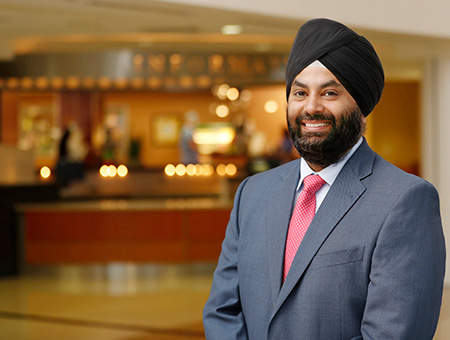
Tejwant Datta, MD, FACS, FASMBS, is a board-certified and fellowship-trained surgeon at Commonwealth Surgical Associates in Richmond, Virginia, who specializes in minimally-invasive, robotic surgery and weight loss management for adults with obesity. Part of HCA Virginia Physicians Network and affiliated with Chippenham, Johnston-Willis, and TriCities Hospitals, Dr. Datta answers questions about weight loss surgery.
When should I seek medical help for my weight with a bariatric weight loss program?
Dr. Datta: Many patients are referred to our practice by their primary care physician for weight loss surgery because they have coexisting conditions like diabetes, heart disease, or sleep apnea that impact their health. Beyond medical conditions, though, many people seek surgical intervention because they simply want to be able to tie their shoes, be active with their children, or travel more comfortably. The personal reasons for wanting to lose excess weight are just as important as the medical reasons.
The American Society for Metabolic and Bariatric Surgery (ASMBS) has specific criteria to qualify patients for weight loss surgery:
- Those with a body mass index (BMI) greater than 35 regardless of other comorbidities.
- Those with a BMI over 30 who also have Type 2 diabetes or similar metabolic disease.
- Those with a BMI 30-34.9 who do not achieve substantial or durable weight loss or comorbidity improvement with nonsurgical methods.
What treatments do you specialize in for weight loss?
Dr. Datta: Our practice specializes in minimally-invasive, robotic techniques that lessen pain, complications, and length of recovery. In fact, most patients only have a one-night hospital stay following their procedure. The two most common surgical procedures are Roux-en-Y gastric bypass and sleeve gastrectomy surgeries:
Roux-en-Y gastric bypass
The Roux en-Y gastric bypass procedure reduces stomach size and reroutes the small intestine to restrict the amount of calories and nutrients that the body absorbs. It is the most common type of malabsorptive surgery. Long-term success depends on adhering to new rules for eating. Advantages include:
- Average weight loss is generally higher than many other surgeries.
- Weight loss is generally maintained the longest in comparison to other weight loss procedures.
Sleeve gastrectomy
The vertical sleeve gastrectomy, commonly referred to as gastric sleeve, is a form of restrictive weight loss surgery in which approximately 85 percent of the stomach is removed. The remaining stomach is about the size of a banana, thus limiting the amount of food it can hold. Advantages include:
- No postoperative adjustments are required.
- Patients lose an average of 55 percent of their excess weight.
- It helps resolve or improve comorbidities such as high blood pressure, obstructive sleep apnea, Type 2 diabetes, and hyperlipidemia.
During the initial consultation, we will discuss the patient’s end goals, risk tolerance, and what type of surgery might be right for them.
What are the risks of weight loss procedures and surgery?
Dr. Datta: As with any surgery, weight loss surgery procedures have some potential risks, including:
- Leaks within the gastrointestinal system
- Infection
- Bowel obstructions
- Dumping syndrome caused by food moving too rapidly from the stomach to the intestines, causing diarrhea, lightheadedness, and nausea
- Acid reflux
- Blood clots
- Breathing issues
Our team of surgeons, physician assistants, and dieticians will discuss with the patient the risks versus benefits to help make an individual determination if surgery is the right option.
How do I ensure my weight loss is successful?
Dr. Datta: At HCA Virginia Physicians, we believe that weight loss surgery is part of a long-term journey to become healthier and to live a healthier life. Along those lines, our team provides a compassionate, patient-centric approach before, during, and after any procedure.
Prior to surgery, our team helps ensure that any pre-existing medical issues are stabilized and that patients demonstrate a commitment to healthy lifestyle habits. In addition, patients have ongoing access to support staff including nutritionists, physical therapists, counselors, and diabetes management specialists.
Following surgery, those who are the most successful focus not just on losing weight but on reducing the medical conditions associated with obesity. To help ensure their success, patients will have regular follow-ups with our team for the first two years and annually thereafter. All patients are invited to participate in our monthly support group meetings where they meet with our team and enjoy guest speaker presentations. Anyone can join, whether they are seeking more information about weight loss surgery, already on their journey towards having weight loss surgery, or are post-surgery and seeking ongoing support.
Following surgery, patients not only lose weight, but most see a significant, lifechanging improvement in their diabetes, cardiovascular, and sleep apnea.
What advancements have been made in recent years in weight loss procedures and surgery options?
Dr. Datta: Minimally invasive, robotic surgery for weight loss has become the standard of care since it was first introduced almost 30 years ago. The focus has shifted from having weight loss surgery primarily for cosmetic reasons to a lifelong approach that uses medical interventions, nutrition, and fitness to treat the effects of obesity as a disease. In addition, complications from surgery continue to improve, as well as shorter hospital stays, and a reduction in post-operative pain and recovery time
At HCA Virginia Physicians, we will create a personalized path to success and help you attain your goals.

Take the first step toward a healthier life. Call 804-533-0220 or visit our practice page to learn more.